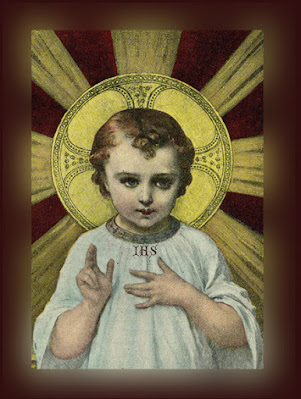St. Titus was a fellow companion of St. Paul on apostolic missions. He was a convert from paganism and later served the Church as Bishop of Crete. It proved to be a difficult responsibility because of the inhabitants and spread of erroneous doctrines on the island of Crete. St. Paul's writings tell us that St. Titus rejoiced in the good in others and drew the hearts of men by his affectionate sympathy. At the age of 94, St. Titus died of natural causes. He lived in the state of virginity his entire life.
Dom Gueranger writes of St. Titus:
We are to celebrate, to-day, the Feast of a holy Bishop of the Apostolic Age—a Disciple of the Apostle St. Paul. Little is known of his life; but, by addressing to him one of his inspired Epistles, the Apostle of the Gentiles has immortalised his memory. Wheresoever the Faith of Christ has been or shall be preached, Titus’ name has been venerated by the Faithful; and as long as the world lasts, the holy Church will read to her children this Epistle, which was written, indeed, to a simple Bishop of the Isle of Crete, but was dictated by the Holy Ghost, and therefore destined to be a part of those Sacred Scriptures, which contain the Word of God. The counsels and directions given in this admirable Letter, were the rule of the holy Bishop, for whom St. Paul entertained a very strong affection. St. Titus had the honour of establishing the Christian Religion in that famous Island, which was one of the strongholds of Paganism. He survived his master, who was put to death by Nero. Like St. John, he sweetly slept in Christ at a very advanced age, respected and loved by the Church he had founded. As we have already observed, his life left but few traces behind it; but these few are sufficient to prove him to have been one of those wonderful men whom God chose as the directors of His infant Church.
Traditional Matins Reading:
Titus, Bishop of Crete, was initiated into the mysteries of the Christian faith by Paul the Apostle; and being prepared by the sacraments, he shed so bright a light of sanctity on the infant Church, that he merited to be chosen as one of the Disciples of the Doctor of the Gentiles. Being called to bear the burden of preaching the Gospel, so ardent and persevering was he in the discharge of that duty, that he endeared himself to St. Paul so much, as to make the Apostle say in one of his Epistles, that being come to Troas, to preach the faith in that city, he found no rest for his heart, because he found not there his brother Titus. And having, a short time after this, gone to Macedonia, he thus expresses his affection for his disciple in these terms: But God who comforteth the humble, comforted us by the coming of Titus.
Being sent to Corinth by the Apostle, he acquitted himself in this mission (which mainly consisted in collecting the alms given by the piety of the faithful towards alleviating the distress of the Hebrew Church) with so much prudence and patience, that he not only confirmed the Corinthians in the faith of Christ, but made them so desirous of a visit from Paul, who had been their first teacher in the faith, that they shed tears of long affection. After having undertaken several journeys, both by sea and land, in order to sow the seed of the divine word among people of various tongues and countries; and after having supported, with great firmness of soul, countless anxieties and fatigues, in order to plant the standard of the Cross;— he landed at the island of Crete in company with his master St. Paul. The Apostle made him Bishop of the Church which he had founded in that island; and it is not to be doubted but that Titus so discharged his duty as that he became a model to the Faithful, according to the advice given to him by his master, in good works, in doctrine, in integrity, in gravity.
Thus did he become a shining light, pouring forth the rays of Christian faith on them that were sitting in the darkness of idolatry and lies, as in the shadow of death. Tradition tells us that he passed into Dalmatia, where he laboured with extraordinary zeal to enlist that people under the banner of the Cross. At length, full of days and merit, in the ninety-fourth year of his age, he slept in the Lord the death of the just, on the vigil of the nones of January (January 4), and was buried in the Church in which the Apostle had appointed him Minister of the word. St. John Chrysostom and St. Jerome pass great eulogium upon this holy Bishop, and his name is inscribed in the Roman Martyrology on the day above mentioned; but the sovereign Pontiff Pius the Ninth ordered his Feast to be kept by the Universal Church.
Today is also the Commemoration of St. Dorothy.
Prayer:O God, Who didst adorn blessed Titus, Thy Confessor and Bishop, with apostolic virtues: grant by his merits and intercession that a life of duty and justice here below may win for us our heavenly home. Through our Lord.
Prayer Source: 1962 Roman Catholic Daily Missal


















